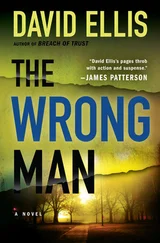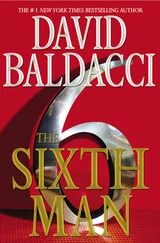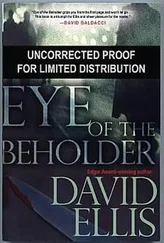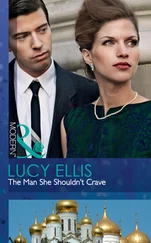Kolarich threw a third document at Smith, who gathered it and read it. It was a sworn affidavit from Jason Kolarich, detailing virtually everything that had happened since Smith first visited his office. “That affidavit,” said Kolarich, “is in my safe-deposit box, in my e-mail, in my lawyer’s e-mail, you name it. Anything happens to me or my brother or Sammy, this affidavit goes to the police. But you stay away from us, Smith, and we stay away from you.” He took another step toward Smith, who winced. “I don’t want my brother to have to think about you ever again.”
“The feeling-the feeling is mutual,” Smith managed.
Kolarich surveyed the scene. “Well, Raymond, I wish I could say it’s been a pleasure.”
“It will be a pleasure-for this to be over,” Smith said. He touched his jaw again, feeling light-headed. He felt himself swooning, losing consciousness, but fought it. He gathered himself together and looked back at the door. Jason Kolarich was gone.
SAMMY WALKED THROUGH the corridor tentatively, a coat thrown over his wrists to hide the handcuffs, people watching him carefully as he passed. He was a celebrity. His story had been splashed everywhere. He was unaccustomed to such notoriety and had responded with silence, refusing requests for interviews and making no comment whatsoever. Still, someone had leaked today’s visit and the media had swarmed outside the hospital today. St. Agnes had made special arrangements for his arrival, escorting him from the Department of Corrections van to a private doctor’s elevator bank to the sixth floor.
Sammy, the two armed deputies, and I stopped outside the room. The deputies uncuffed him, per an earlier agreement reached between the Department of Corrections and me. Sammy looked back at me, as if seeking advice.
“She’s your sister, Sammy,” I said.
He nodded and looked at the door. “Come with me, Koke?”
I followed him into the room as he came upon her. He stood, motionless, for what felt like a lifetime. He didn’t speak, either. What he was seeing was a very, very sick woman who didn’t have long to live. Dialysis was keeping her alive but not for long.
But he was also seeing his sister, for the first time in twenty-eight years.
He pulled up a chair and sat, his trembling hands in his lap. “Hi,” he said awkwardly, unsure of himself. Then he leaned closer to her ear. “Hi, Patricia.”
I winced. Sammy was calling his sister by the name she’d known almost her entire life, the one given to her by the Butchers. If she survived the kidney transplant, she’d have plenty of time to learn the story. For now, she was Patricia.
“I don’t know if you can hear me,” he said. “This probably doesn’t make sense to you, but I’ve missed you. I’ve thought about you-”
It came at once, the emotion, closing off his throat. His chest spasmed. Tears began to streak down his face. He touched her hand and then took it in his, stroking it. “You’re gonna be-you’re gonna be okay now,” he whispered. “You’re gonna be okay now.”
“TIME SERVED,” I said. “First of all, he didn’t do it. Second of all, let’s let this poor guy be with his sister.”
Judge Kathleen Poker, sitting in her high-backed leather chair in chambers, was receptive to my plea, particularly in light of recent media interest in the case. Sammy was being bathed in a sympathetic light, and no one was feeling sorry for a child predator who had killed four children and molested countless others. That had been another benefit of the media intensity over the last week and a half-the state police had expedited the DNA testing and confirmed that Griffin Perlini had raped each of the four girls found buried behind Hardigan Elementary School.
I had a child killer for a victim and an aggrieved man recently reunited with his abducted sister for a defendant.
The judge made a steeple with her hands, touching them to her lips. “Yes, I notice there was no diminished-capacity defense. Your client maintains he didn’t do it?”
“Yes, Your Honor. In fact, we think we know who did. We named him on the witness list. Archie Novotny. His daughter was molested by Griffin Perlini. He has the same jacket, and the same green stocking cap, that witnesses confirmed the killer was wearing. And he has no alibi for that night.”
The judge’s eyes shifted to Lester Mapp, the prosecutor. “Judge, look. We don’t want to bury this guy. We don’t-we don’t need that. But we can’t give this guy a pass, either.”
“And what about this Novotny person?” the judge asked.
Mapp let out a sigh. “We haven’t been able to speak with him yet, Judge. He won’t talk to us.”
The judge looked at the prosecutor with curiosity. “That’s called obstruction, isn’t it?”
“Not if you’re taking Five,” I interjected.
“Ah.” The judge nodded. “He’s invoked his rights.”
“Yeah, that should play out well at trial,” I noted.
“We think we’ll be giving him immunity, Judge.” Lester Mapp was generally displeased with the state of affairs and, of late, no doubt, with his assignment to this case in the first place.
“He thinks,” I said. “He thinks he’ll give Novotny immunity. He says he thinks because he’s not sure that Novotny didn’t commit this crime, and he wants to be careful what he wishes for.”
“I understand, I understand.” The judge raised a hand. “Mr. Mapp, where is the state on a plea?”
“We offered ten, Judge.”
She thought about that. “Mr. Kolarich, can I assume you’ll be asking for an instruction on involuntary?”
“I certainly will, Judge.” When a defendant is charged with a crime like first-degree murder, a defendant can ask that the jury be instructed on a lesser-included offense, which here would include involuntary manslaughter. It’s up to the judge, but if the court believes that the evidence warrants a finding on a lesser-included offense, she can give that option to the jury.
The nice thing about involuntary manslaughter is that the judge can impose a sentence down to probation. Everyone in the room knew what she was doing. She was telling Lester Mapp that she could drop the sentence well below the ten years he was seeking.
“Give us a minute, Counsel,” the judge said to me. It was common for judges to conduct pretrials with each lawyer separately, provided all sides agreed to such ex parte communications.
I went into the courtroom and sat. In the last couple of weeks, I had slowly recovered sleep. I hadn’t done any legal work except for Sammy. I’d spent a lot of time with my brother, whose newly buffered bank account, courtesy of Raymond “Smith” Hertzberg, had given him the freedom to decide to return to school for a master’s degree.
Sammy was going under tomorrow for the kidney transplant. He’d left me with the same instructions as he had earlier. He could take a twelve-year sentence, he’d prefer eight. So I was going a little off the reservation here, but I didn’t see what interest of justice was served by putting Sammy Cutler behind bars for several years. The way I saw it, Griffin Perlini probably would have returned to his old ways had Sammy not performed a community service by shooting him.
About twenty minutes later, Lester Mapp passed the torch to me. He sat in the courtroom as I returned to the judge’s chambers.
“Involuntary and four years,” said the judge. “Your client already has one in. He’s looking at about another year.”
Half of which would be spent at a halfway house on his way out of the system. God bless the severely overcrowded state prison system.
“I have authority for three,” I said, taking my best shot.
“No, four’s the best you’re going to do.” She threw up her hands. “Four it is, Mr. Kolarich. Take it or leave it.”
Читать дальше












